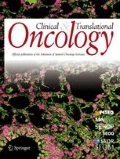Abstract
Research in genetics has facilitated the identification of highly penetrant genes responsible for a large number of diseases. In the oncology field, genetic counselling and gene testing are focused on the two most common syndromes in familial cancer: hereditary breast and ovarian cancer syndrome (HBOC) and hereditary non-polyposis colorectal cancer or Lynch syndrome (LS). The objective of this guideline in hereditary cancer is to summarise the current state of knowledge and make recommendations in the areas of diagnosis, prevention and treatment of hereditary cancer.
Similar content being viewed by others
References
Chen S, Parmigiani GJ (2007) Meta-analysis of BRCA1 and BRCA2 penetrance. Clin Oncol 25:1329–1333
Milne RL, Osorio A, Ramón y Cajal T et al (2008) The average cumulative risks of breast and ovarian cancer for carriers of mutations in BRCA1 and BRCA2 attending genetic counselling units in Spain. Clin Cancer Res 14:2861–2869
Malone KE, Begg CB, Haile RW et al (2010) Population-based study of the risk of second primary contralateral breast cancer associated with carrying a mutation in BRCA1 or BRCA2. J Clin Oncol 28:2404–2410
Metcalfe KA, Lynch HT, Ghadirian P et al (2005) The risk of ovarian cancer after breast cancer in BRCA1 and BRCA2 carriers. Gynecol Oncol 96:222–226
Liede A, Karlan BY, Narod SA et al (2004) Cancer risks for male carriers of germline mutations in BRCA1 or BRCA2: a review of the literature. J Clin Oncol 22:735–742
Young SR, Pilarski RT, Donenberg T et al (2009) The prevalence of BRCA1 mutations among young women with triple-negative breast cancer. BMC Cancer 9:86
King MC, Marks JH, Mandell JB (2003) Breast and ovarian cancer risks due to inherited mutations in BRCA1 and BRCA2. New York Breast Cancer Study Group. Science 302:643–646
Domchek SM, Friebel TM, Neuhausen SL et al (2006) Mortality after bilateral salpingo-oophorectomy in BRCA1 and BRCA2 mutation carriers: a prospective cohort study. Lancet Oncol 7:223–229
Domchek S, Friebel T, Singer C et al (2010) Association of risk-reducing surgery in BRCA1 or BRCA2 mutation carriers with cancer risk and mortality. JAMA 304:967–975
Rebbeck TR, Kauff ND, Domchek SM (2009) Meta-analysis of risk reduction estimates associated with risk-reducing salpingo-oophorectomy in BRCA1 or BRCA2 mutation carriers. J Natl Cancer Inst 101:80–87
Antoniou AC, Rookus M, Andrieu N et al (2009) Reproductive and hormonal factors, and ovarian cancer risk for BRCA1 and BRCA2 mutation carriers: results from the International BRCA1/2 Carrier Cohort Study.10. Cancer Epidemiol Biomarkers Prev 18:601–610
Saslow D, Boetes C, Burke W et al (2007) American Cancer Society guidelines for breast screening with MRI as an adjunct to mammography. American Cancer Society Breast Cancer Advisory Group. CA Cancer J Clin 57:75–89
Rebbeck TR, Friebel T, Lynch HT et al (2004) Bilateral prophylactic mastectomy reduces breast cancer risk in BRCA1 and BRCA2 mutation carriers: the PROSE Study Group. J Clin Oncol 22:1055–1062
King MC, Wieand S, Hale K et al (2001) Tamoxifen and breast cancer incidence among women with inherited mutations in BRCA1 and BRCA2: (NSABP-P1) Breast Cancer Prevention Trial. JAMA 286:2251–2256
Kauff ND, Mitra N, Robson ME et al (2005) Risk of ovarian cancer in BRCA1 and BRCA2 mutation-negative hereditary breast cancer families. J Natl Cancer Inst 97:1382–1384
Vasen HFA, Möslein G, Alonso A et al (2007) Guidelines for the clinical management of Lynch syndrome (hereditary non-polyposis cancer). J Med Genet 44:353–362
Lynch HT, Boland CR, Rodriguez-Bigas MA et al (2007) Who should be sent for genetic testing in hereditary colorectal cancer syndromes? J Clin Oncol 25:3534–3542
Hampel H, Frankel WL, Martin E et al (2008) Feasibility of screening for Lynch syndrome among patients with colorectal cancer. J Clin Oncol 26:5783–5788
Piñol V, Castells A, Andreu M et al (2005) Accuracy of revised Bethesda guidelines, microsatellite instability, and immunohistochemistry for the identification of patients with hereditary nonpolyposis colorectal cancer. JAMA 293:1986–1994
Lu KH, Schorge JO, Rodabaugh KJ et al (2007) Prospective determination of prevalence of Lynch Syndrome in young women with endometrial cancer. J Clin Oncol 25:5158–5164
Balmaña J, Stockwell DH, Steyerberg EW et al (2006) Prediction of MLH1 and MSH2 mutations in Lynch syndrome. JAMA 296:1469–1478
Lindor NM, Rabe K, Petersen GM et al (2005) Lower cancer incidence in Amsterdam-I criteria families without mismatch repair deficiency: familial colorectal cancer type X. JAMA 293:1979–1985
Jarvinen HJ, Aarnio M, Mustonen H et al (2000) Controlled 15-year trial on screening for colorectal cancer in families with hereditary nonpolyposis colorectal cancer. Gastroenterology 118:829–834
Schmeler KM, Lynch HT, Chen LM et al (2006) Prophylactic surgery to reduce the risk of gynecologic cancers in the Lynch syndrome. N Engl J Med 354:261–269
Author information
Authors and Affiliations
Corresponding author
Additional information
on behalf of the Hereditary Cancer Section SEOM
Equal contributors
Hereditary Cancer Section SEOM. Executive Committee 2009–2011: Judith Balmaña, Carmen Guillem, Encarnación González, Santiago González, Begoña Graña, Enrique Lastra, Luis Robles
Rights and permissions
About this article
Cite this article
Graña, B., Lastra, E., Llort, G. et al. SEOM clinical guidelines for hereditary cancer. Clin Transl Oncol 13, 580–586 (2011). https://doi.org/10.1007/s12094-011-0701-2
Received:
Accepted:
Published:
Issue Date:
DOI: https://doi.org/10.1007/s12094-011-0701-2




